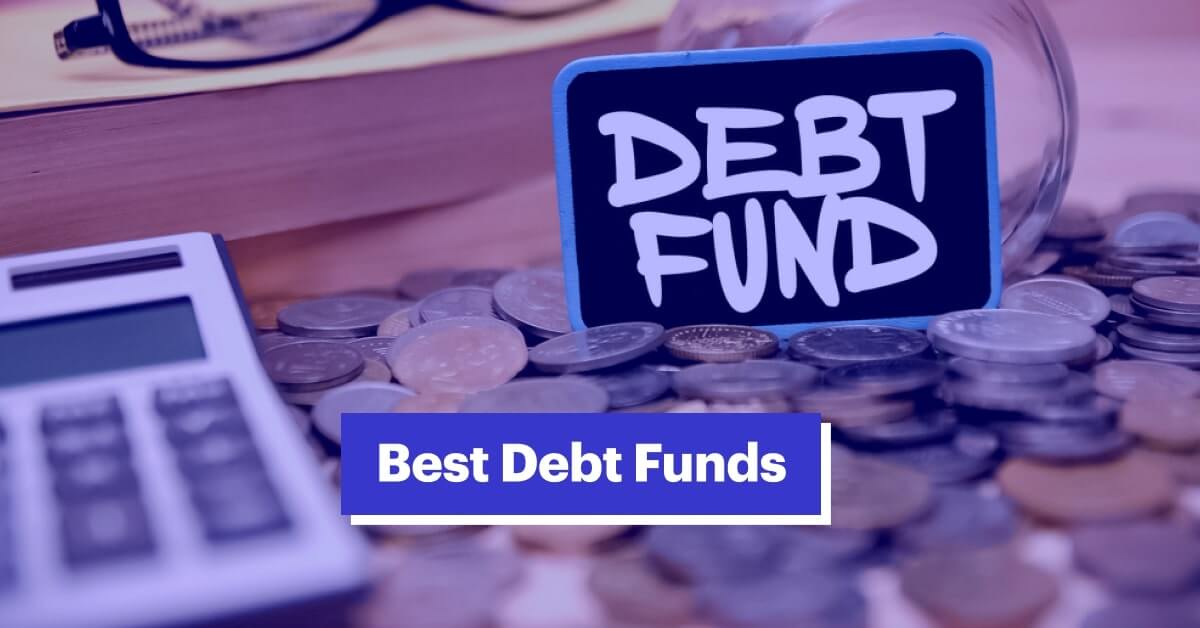
List of 5 Best Debt Funds in India 2025
A mutual fund is an investment pool that allows investors to invest in securities, such as short-term debt fund, bonds, stocks, etc., and the combined holding of mutual fund is known as portfolio.
A mutual fund that provides a fixed income by investing in money marketing instruments, corporate debt securities, Government Bonds, and Corporate Bonds is a debt fund. When compared to several other mutual funds, investing in debt funds is less risky. Usually, investments in debt funds are made on a short-term basis.
What is a Debt Fund?
Debt fund is one of the major investment instruments preferred by most investors with low risk tolerance.
Debt funds are one of the financial instruments included in the debt market that ensures easy buying and selling of loans in exchange for interest. Though these funds offer low returns compared to equity investments, they ensure lower risk than equity investments.

Best Debt Funds to Invest in 2024
Some of the top debt funds are mentioned below:
| Fund Name | Risk | 1Y Returns |
| Baroda BNP Paribas Credit Risk Fund | High | 7.9% |
| ICICI Prudential Short Term Fund | High | 7.75% |
| UTI Medium to Long Duration Fund | Moderate | 5.9% |
| Aditya Birla Sun Life Medium Term Plan | High | 7.24% |
| Nippon India Ultra Short Duration Fund | Moderate | 7.5% |
Different Types of Debt Mutual Fund
The different types of debt mutual funds that are available are mentioned below:
- Credit Opportunity Funds: Under Credit Opportunity Funds, investments are made in securities that are low-rated. The returns that are generated from these funds are good since the risk is high.
- Gilt Funds: Under such funds, investments are made in government securities that are high-rated but do not have a credit risk.
- Long Duration Funds: Investments are made in debt securities that come with a tenure of above 7 years.
- Short Duration Funds: Investments are made in debt securities that come with a tenure ranging between one year and three years.
- Dynamic Bond Funds: The maturity period varies in such mutual funds. Investments in Dynamic Bond Funds come with moderate risk.
- Liquid Funds: The maturity period of such a fund is 91 days. When compared to a savings account, higher returns are offered.
- Money market fund: Invests in money market instruments with maturity of maximum one year and are suitable for investors who wish to invest in low-risk debt securities for short-term.
- Dynamic bond fund: Based on interest rate regime, dynamic bond fund invests in debt instruments of varying maturities and are suitable for investors with moderate risk tolerance and investment horizon ranging between three to five years.
- Banking and PSU fund: Investing done in debt securities of PSUs (Public Sector Undertakings) and banks, which is 80% of the total assets.
- Credit risk fund: Funds that invest 65% of investible corpus in corporate fund with ratings below the highest quality corporate bonds.
- Floater fund: Invest in floating rate instrument of only 65% of its investible corpus and carries low interest rate risk.
- Overnight fund: One of the safest debt funds that invest in securities with maturity of one day and has negligibel credit and interest rate risk.
- Ultra-short duration fund: Investment is done in debt securities and money market instruments with Macaulay duration between three and six months.
- Low duration fund: Investment is done in debt securities and money market instruments with Macaulay duration between six and twelve months.
- Medium duration fund: Investment is done in debt securities and money market instruments with Macaulay duration between three and four years.
- Medium to long duration fund: Investment is done in debt securities and money market instruments with Macaulay duration between four and seven years.
How do Debt Funds Work?
Here are the details on how debt funds work:
- Debt funds have credit ratings that help in understanding the default in disbursing the principal and interest by the debt issuer.
- To select high-quality debt instruments, debt fund managers use these credit ratings, and these are less likely to default.

Who should Invest in Debt Funds?
The following are the ideal investors in debt funds:
- Risk-averse investors looking for steady income, such as retired persons
- Conservative or first-time mutual fund investors
- Combining a debt fund with a Systematic Transfer Plan (STP), aggressive equity investor can also invest in debt fund
- Households and businesses can also invest in debt funds
Taxation in Debt Funds
The following are the details regarding taxation involved in debt funds:
- Dividends and capital gains can be earned from debt funds, where capita gain is the price difference between purchase price and selling price of each unit.
- Capital gains are taxed depending on the duration for which the units of a mutual fund are held by the investor
- If debt fund is redeemed after holding for more than three months then long-term capital gain and is taxed at 20%, which also gets the benefit of indexation.
Difference between Debt Funds and Recurring Deposits
The main differences between debt funds and recurring deposits are mentioned in the table below:
| Category | Debt Funds | Recurring Deposits |
| Section 80C | In case the investment is made in an Equity Linked Savings Scheme, tax exemption is provided. | No tax exemption. |
| Low Taxes | Lower tax can be paid if the investment is more than three years. | The tax remains the same throughout the tenure. |
| Liquidity | You can withdraw the money without paying a penalty. | A penalty may have to be paid in the case of premature withdrawal. |
| Customisation | Debt funds can be customised as per your requirements. | Recurring deposits cannot be customised. |
| Returns | Returns are high. | Returns are comparatively low. |

Things to Consider before Investing in Debt Funds
The following are the factors that should be considered before investing:
Risks in Debt Funds: Considering the risk factors before selecting the debt funds is vital so that you can minimise the market risk or other co-related risks involved. The following are three main types of risks, such as:Liquidity risk: Fund house not having enough liquidity to fulfil the redemption request, then the risk incurred is known as liquidity risk.
Interest rate risk: The value of the scheme’s security gets affected due to a change in interest rate, which is known as interest rate risk.
Credit risk: Failing to repay the principal and interest that results in default risk incurred by the issuer, which is known as credit risk
.Expense Ratio: The percentage of fund’s total asset which is invested as fee towards fund management services is the expense ratio and is a vital aspect of debt funds. High expense ratio will reduce the earning as the return in debt funds is not very high. Hence, it is vital to consider the expense ratio before selecting a particular debt fund.
Returns: Think twice before investing in a debt fund, as the return from these funds is much lower than equity funds and does not guarantee your return value.
FAQs on Debt Funds
- How do I choose a debt fund?To choose a suitable debt fund for yourself, first decide your investment horizon and select the fund category. Then select the fund that aligns with your investment horizon.
- Should I invest in a short-term debt fund?Yes, you should invest in a short-duration debt fund as these are the preferred option for near-term goals and the value of these funds does not fall easily with an increase in interest rates unlike the long-duration funds.
- How to decide which debt fund is suitable for me?It depends on your investment horizon which debt fund is suitable for you. If you wish to invest for a day to up to a month, then overnight funds or liquid funds are ideal for you.
- Which debt funds are safe?Among various debt fund options, overnight funds are the safest option as they invest in securities that mature in one day and do not have credit or interest risk. Even liquid funds are also safe, as they invest only in debt and money market securities with maturities of up to 91 days and come without credit or interest risk.
- What are some of the examples of debt funds?Government securities, T-bills, bonds, certificates of deposits, commercial papers, etc. are some of the tools in which you can invest if you want to invest in debt funds.
- Do investments in a debt fund come with a lock-in period?No, investments in a debt fund do not come with a lock-in period.
- Are there any risks involved in debt funds?Certain debt funds such as Liquid Funds come with no risk. However, some debt funds come with risks.
Courtsey To : Bankbazaar









Average Rating